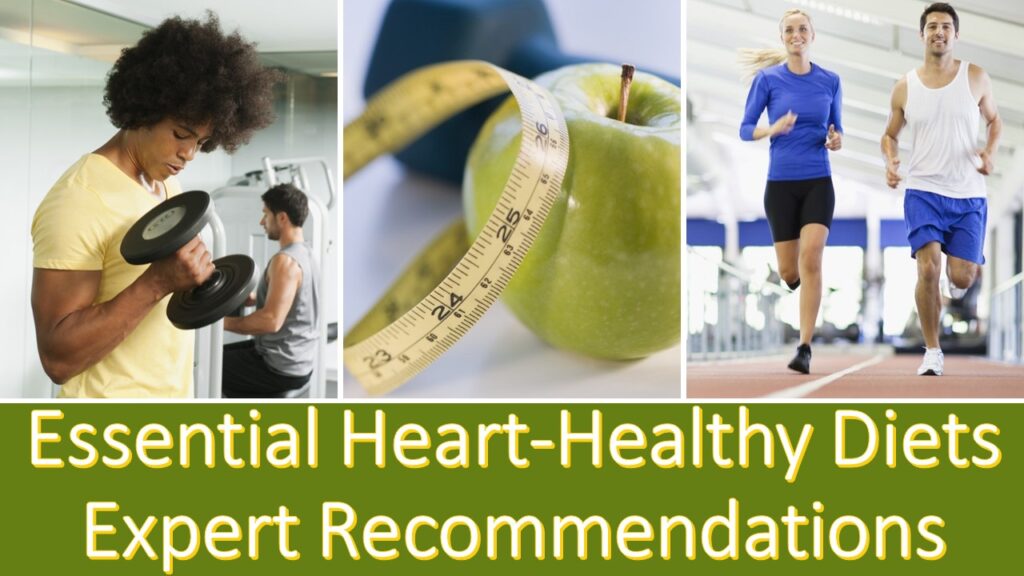Essential Heart-Healthy Diets
For heart patients, maintaining a heart-healthy diet is crucial. Some of the best diets recommended for heart health include:
Essential Heart-Healthy Diets
- Mediterranean Diet: This diet emphasizes fruits, vegetables, whole grains, legumes, nuts, seeds, and healthy fats like olive oil. It also includes moderate amounts of fish and poultry while limiting red meat intake. The Mediterranean diet has an association with a decreased risk of heart disease.
- DASH Diet (Dietary Approaches to Stop Hypertension): This diet focuses on reducing sodium intake while emphasizing fruits, vegetables, whole grains, lean proteins, and low-fat dairy. This approach has been proven to effectively lower blood pressure and reduce the risk of heart disease.
- Plant-Based Diets: Vegetarian or vegan diets that emphasize plant-based foods while minimizing or excluding animal products can be beneficial for heart health. They tend to be high in fiber, antioxidants, and healthy fats.
- Low-Sodium Diet: For individuals with high blood pressure or heart conditions, reducing sodium intake is crucial. This involves avoiding processed foods, canned goods, and excessive salt in cooking.
- The TLC Diet (Therapeutic Lifestyle Changes): This diet is specifically designed to lower cholesterol levels and reduce the risk of heart disease. It includes reducing saturated fats, dietary cholesterol, and overall calories while emphasizing healthy fats, fiber, and whole grains.

It’s important for heart patients to consult with a healthcare professional or a registered dietitian before making significant changes to their diet. The right diet can vary based on individual health conditions, medications, and specific needs. Additionally, combining a healthy diet with regular exercise and other lifestyle changes can significantly improve heart health.
FAQ Essential Heart-Healthy Diets
Absolutely! Here’s a revised version with headings for each FAQ:
What is heart disease?
Heart disease encompasses various conditions affecting the heart’s structure and function, including coronary artery disease, arrhythmias, and heart failure.
What are the common risk factors for heart disease?
Common risk factors include high blood pressure, high cholesterol, smoking, diabetes, obesity, lack of physical activity, unhealthy diet, family history, and age.
How can I prevent heart disease?
Prevention involves adopting a healthy lifestyle: maintaining a balanced diet, exercising regularly, avoiding smoking, managing stress, controlling blood pressure and cholesterol, and regular health check-ups.
What role does diet and exercise play in heart health?
A balanced diet rich in fruits, vegetables, whole grains, lean proteins, and healthy fats, along with regular exercise, helps control weight, blood pressure, and cholesterol, reducing the risk of heart disease.
What are the symptoms of a heart attack?
Symptoms include chest discomfort, pain in the arms, back, neck, jaw, or stomach, shortness of breath, cold sweat, nausea, and lightheadedness.
When should I seek immediate medical attention for heart-related issues?
Seek immediate help for symptoms of a heart attack, such as chest pain or discomfort lasting more than a few minutes, or symptoms that worsen over time.
What tests are commonly used to diagnose heart conditions?
Common tests include electrocardiogram (ECG/EKG), stress tests, echocardiogram, cardiac catheterization, and blood tests to check cholesterol and other markers.
What lifestyle changes can I make to improve my heart health?
Lifestyle changes include quitting smoking, eating a heart-healthy diet, exercising regularly, managing stress, controlling blood pressure and cholesterol, and maintaining a healthy weight.
Are there specific diets recommended for heart health?
The focus on whole foods, fruits, vegetables, and healthy fats makes diets like the Mediterranean diet, DASH diet, or plant-based diets recommended for heart health.
What are the differences between heart attack, stroke, and cardiac arrest?
Blockage or reduction in blood flow to the heart causes a heart attack, while a stroke results from decreased blood flow to the brain. Cardiac arrest, on the other hand, is the sudden loss of heart function.
What medications are commonly prescribed for heart conditions?
Doctors may prescribe medications like aspirin, statins, beta-blockers, ACE inhibitors, and others based on the specific heart condition.
How does stress affect heart health?
Chronic stress can contribute to high blood pressure and other heart disease risk factors. Managing stress through relaxation techniques and lifestyle changes is important for heart health.
Are there alternative therapies or supplements that benefit heart health?
Some supplements like omega-3 fatty acids and CoQ10 may have benefits, but it’s crucial to consult with a healthcare professional before taking any supplements.
What are the warning signs of heart disease that I should not ignore?
Warning signs include chest pain, shortness of breath, dizziness, fatigue, irregular heartbeat, and swelling in the legs or abdomen.
What should I do in case of a suspected heart attack or cardiac event?
Call emergency services immediately (911 in the U.S.); do not delay. If possible, chew and swallow an aspirin unless allergic or advised otherwise by a doctor.
Maintaining Healthy Blood Flow
Preventive Measures for Vein Health
Absolutely, here are the preventive measures categorized with headings to avoid vein blockage and promote healthy blood flow:
Lifestyle Changes:
- Regular Exercise: Engage in activities like walking, swimming, cycling, or yoga to improve circulation and maintain healthy veins.
- Maintain Healthy Weight: Keep a balanced diet and exercise regularly to manage weight, reducing strain on veins.
- Healthy Diet: Emphasize fiber-rich foods, fruits, vegetables, and limit saturated fats to support heart health and optimal blood flow.
Daily Habits:
- Stay Hydrated: Drink plenty of water to prevent dehydration, ensuring smooth blood flow and reducing strain on veins.
- Movement Breaks: Take breaks from prolonged sitting or standing to move and prevent excessive strain on veins.
- Leg Elevation: Elevate legs when resting to facilitate better blood circulation, particularly in the lower extremities.
Clothing and Posture:
- Avoid Tight Clothing: Opt for loose-fitting clothes to prevent unnecessary pressure on veins, ensuring healthy blood flow.
- Maintain Good Posture: Practice good posture to alleviate pressure on veins, especially in the legs.
Health Management:
- Quit Smoking: Smoking damages blood vessels and increases the risk of blood clots and vein problems.
- Manage Chronic Conditions: Control diabetes, high blood pressure, and high cholesterol to support blood vessel health.
Additional Measures:
- Compression Stockings: Consider these under professional guidance, especially for jobs involving prolonged sitting or standing.
- Regular Check-ups: Visit healthcare providers routinely for check-ups to monitor and manage potential vein-related issues.
- Stress Reduction: Practice stress-relief activities like meditation or hobbies to manage stress, benefiting overall circulation.
Adopting these preventive measures can significantly reduce the risk of vein blockages. However, personalized advice from a healthcare professional is essential based on individual health conditions and risks.
